As global sustainability efforts accelerate, industries traditionally reliant on blue-collar workers are becoming key drivers of green innovation. From renewable energy infrastructure to sustainable construction and waste management, blue-collar talent is at the forefront of building a cleaner, more sustainable future. This shift is reshaping workforce priorities, increasing demand for skilled workers, and introducing new hiring trends in green-focused sectors.
Why Blue-Collar Talent is Essential for Green Innovation
Sustainability has evolved from a niche concern into a core business strategy. Governments, investors, and consumers are pushing for environmentally responsible operations, leading to an urgent need for skilled labor in industries transitioning to greener practices. Jobs in renewable energy, energy-efficient construction, and waste reduction are growing rapidly, with roles such as wind turbine technicians and solar panel installers among the fastest-expanding professions globally.
Key Blue-Collar Roles Powering Green Industries
- Wind Turbine Technicians: These professionals install, maintain, and repair wind turbines, playing a vital role in expanding wind energy capacity.
- Solar Panel Installers: As demand for solar energy grows, workers skilled in photovoltaic system installation and maintenance are in high demand.
- Energy-Efficient Construction Workers: Carpenters, electricians, and other tradespeople with expertise in sustainable building techniques contribute to energy-efficient structures.
- Recycling and Waste Management Operators: Workers in this field enhance waste reduction strategies, improving recycling rates and supporting circular economy goals.
- Green Manufacturing Technicians: Specialists in sustainable production methods help industries minimize waste and energy consumption.
Challenges in Meeting the Demand for Green Talent
Despite the rising need for blue-collar workers in green industries, employers face hurdles in sourcing talent with specialized skills. Rapid technological advancements and the evolving nature of sustainability-focused roles contribute to skill shortages. To overcome these challenges, companies are offering competitive wages, career development programs, and attractive benefits to attract and retain workers.
Trends in Recruiting for Green-Focused Blue-Collar Jobs
- Apprenticeships and Training Programs: Companies are investing in workforce development to close skill gaps and prepare employees for green roles.
- Partnerships with Vocational Schools: Collaborating with trade schools ensures a steady pipeline of workers trained in sustainability-focused skills.
- Localized Hiring Strategies: Since many green jobs require on-site labor, companies prioritize recruitment efforts in local talent pools.
- Diversity and Inclusion Initiatives: Businesses are expanding their hiring efforts to include underrepresented groups, broadening the workforce for sustainable industries.
The Role of Recruitment Agencies
Staffing agencies specializing in blue-collar talent are playing a crucial role in bridging the labor gap. By leveraging extensive networks and industry expertise, they connect employers with qualified professionals ready to drive sustainability efforts. Additionally, agencies provide insights into market trends, ensuring businesses remain competitive in their hiring strategies.
Read more about Barona Teknik & Installation
The Future of Blue-Collar Talent in Green Industries
As sustainability becomes a defining factor across industries, demand for skilled blue-collar workers will continue to rise. Companies that prioritize workforce development and strategic recruitment today will be well-positioned to lead in the green economy of tomorrow. Investing in talent now will not only drive innovation but also create a future where economic growth and environmental responsibility go hand in hand.
For businesses and workers alike, the opportunity to shape a sustainable future is now. Blue-collar talent is the backbone of the green transition, ensuring that industries can meet sustainability goals and build a cleaner, more resilient world.
Contact us





